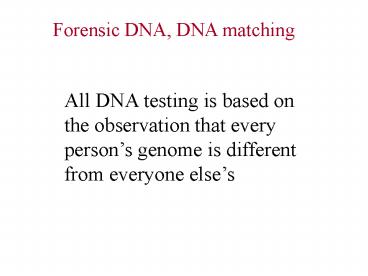All DNA testing is based on - PowerPoint PPT Presentation
1 / 22
Title: All DNA testing is based on
1
Forensic DNA, DNA matching
All DNA testing is based on the observation that
every persons genome is different from everyone
elses
2
Types of DNA Functional Single copy genes -
Otx Gene families similar genes at
multiple loci ie. actins, keratins,
histones Tandem gene family arrays
rRNA Non-coding functional sequences
telomeres, repeats (TTAGGG) at tips of
chromosomes
3
Non-functional DNA sequences Highly repetitive
centromeric DNA DNA found in/near centromere
(but not involved with kinetochore attachment) VN
TRs 15-100 bp tandem repeats - number of
repeats is highly variable, - useful as DNA
fingerprints Transposed sequences RNA origin,
inserted in genome by retroviruses. Spacer
DNA what is left
4
300-fold difference between the genome sizes of
yeast and mammals, but only a modest 4-5-fold
increase in overall gene number
5
Functional Importance
Histones Tubulins Otx (Transcription
factors regulate gene expression) Alba wing
color polymorphism VNTR sequences
Rate of sequence evolution
6
To identify differences, you can perform a
southern blot cut the DNA with a restriction
enzyme that recognizes and cuts specific
sequences, run the cut DNA on a gel, probe it
with a sequence that binds the VNTR
7
(No Transcript)
8
To identify differences, you can perform a
polymerase chain reaction, which requires much
less DNA. The reaction makes many copies of the
VNTR from a very small amount of DNA. It is The
method of choice in forensics
9
The Polymerase Chain Reaction (PCR)
Suspects DNA
Conserved sequence
More DNA
Conserved sequence
More DNA
VNTRs
Primers that match Conserved sequence
Primer 2
Primer 1
10
The Polymerase Chain Reaction (PCR)
Conserved sequence
Conserved sequence
VNTRs
1) Melt DNA heat it to 95 degrees C.
2) Cool to allow primers to bind DNA
11
3) DNA polymerase binds double stranded DNA
4) DNA synthesis
12
5) Melt DNA
6) Cool and allow primers to bind
13
7) DNA synthesis
8) Melt DNA, allow primers to bind, DNA synthesis
14
(No Transcript)
15
You must know how much variation there is in the
population for the sequence you are using as a
fingerprint
Only a little false positives
Use many loci to reduce the possibility of false
positives
16
D2s44 locus - a highly variable locus There
are 28 different alleles of the D2s44 locus so
for two people to have the identical genotype if
all the alleles are equally common
1/28 1/28 .0013 or 13 in 1000
if you test 10 genes, each with 28
alleles .0013 .0013.. (.0013)10 a very
small chance of a false positive
17
The human genome project established in 1990 as
a joint venture of over 12 countries
- Goals
- Map the 22 autosomes, X and Y
- Identify our genes (30,000 - 40,000)
- Sequence our genome (3 billion nucleotides)
- Sequence and map other model organisms
- Develop computing technologies to analyze data
- Disseminate information, consider ethical
- Implications ie. GATTACA, Health Insurance
18
- Whose DNA?
- two males
- three females
- includes a Caucasian, African American,
- Hispanic, and Asian
Hoped to have 1/3 of the genome sequenced by 2001
19
Method for cloning the Human genome
New, faster strategy shotgun cloning
developed by Craig Venter, skips restriction
mapping. the project was finished in 2001
EcoRI cut
20
Shotgun Cloning
1) Isolate human chromosome
2) Isolate DNA from chromosome
3) Shear DNA into bits, clone bits into bacterial
plasmids
4) Sequence bits
5) Find and align overlapping sequence
21
- 95 does not code for protein!
- 31 shared with yeast
- 40 with nematode roundworms
- 50 with fruit flies
- 90 with mice
22
Human proteome project is next What is the
function of all these sequences?































